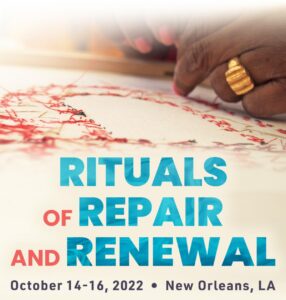“It’s been getting weirder. I can’t wait for next year.”

Diana Heney is a 2022-2023 RPW Center Faculty Fellow. This year’s group is exploring the theme of “Mending and Transforming.”
“It’s been getting weirder. I can’t wait for next year.”
This is the insight a colleague shared with me in the final session of my first trip to Imagining America. They had been to several previous IA gatherings and kept coming back. Although it was my first IA, I found myself instinctively agreeing.
For context: we were painting with soil samples. Specifically, painting pictures of our home-places, our rooted relations to land or to the concepts that helped us to make sense of having a place in the world, our place in the world. The session facilitators were a wonderfully reflective group of Latine/x/a/o scholars centering their inquiry around the theme of Tierra Madre. If this was weird, it was a profound and satisfying good-weird.
 I’m proud to say that our Vanderbilt team also brought some of that good-weird. When I say “our team”, I really mean “our ringleader”: the associate director of the Robert Penn Warren Center, Elizabeth Meadows, whose carry-on was both absolutely stuffed and absolutely bizarre. Our session, “Creating and Archive of Renewal: From Routine to Ritual”, was spectacularly supplied with objects around which rituals might be centered at different times of day. Tea cup, check. Running shoe, check. Gorgeous novels, check. Leaves foraged from the Tulane campus, check. [Insert the voice of Leah Lowe (Theater, Director of the Curb Center): “overly reliant on props!”]
I’m proud to say that our Vanderbilt team also brought some of that good-weird. When I say “our team”, I really mean “our ringleader”: the associate director of the Robert Penn Warren Center, Elizabeth Meadows, whose carry-on was both absolutely stuffed and absolutely bizarre. Our session, “Creating and Archive of Renewal: From Routine to Ritual”, was spectacularly supplied with objects around which rituals might be centered at different times of day. Tea cup, check. Running shoe, check. Gorgeous novels, check. Leaves foraged from the Tulane campus, check. [Insert the voice of Leah Lowe (Theater, Director of the Curb Center): “overly reliant on props!”]
Our aim was to invite participants to reflect on a time of day that they have a routine – or would like to have a routine – that could become a restorative ritual. We would think and share together about how to rest, how to resist being governed by expectations of productivity at every moment, how to commit to renewal in daily practices.
Part of what I had to offer in our session were a philosopher’s usual tools: drawing distinctions, clarifying concepts. But the distinction at the heart of our session – the difference between a mere routine and an honored ritual – is so deeply human that all of our participants were invested in thinking it through. The concept of rest reframed as a necessity and a right, not a luxury or something to be earned, is so critical in this moment. At the end of our session, we gave our participants the option to include a reflection on how they wanted to move from a routine to a ritual for a practice in their own lives. We would produce an archive we could then share, an archive of rest.
Every single participant gave us permission to include their reflection.
 That generosity – of engagement, of exchange – encapsulates my experience of Imagining America. People came to be generous and generative, to be involved fully, to imagine freely.
That generosity – of engagement, of exchange – encapsulates my experience of Imagining America. People came to be generous and generative, to be involved fully, to imagine freely.
The tone for that came from day one, session one. Ashé Cultural Arts Center offered up an incredible opening. Every performance was a lesson; every lesson was a performance. The power of words and of names. Building something beautiful and trusting someone else to carry that beauty forward. Community and culture.
The tone came from New Orleans, the city that had waited to host us through a pandemic.
The tone was consistent across all the sessions I attended at Tulane, including gatherings around reparative storytelling, mentoring graduate students as equity-minded scholars, and arts-based collaboration in nursing research and practice.
I had no idea what I would be imagining at Imagining America. I left enriched and enlivened, imagining new directions for my own work in the medical humanities and new possibilities for Vanderbilt students.
I can’t wait for next year.
You can learn more about Imagining America on their website, including information on their annual graduate and undergraduate student fellowship programs.
Diana Heney is Assistant Professor of Philosophy. She specializes in American pragmatism and bioethics. Her book, Toward a Pragmatist Metaethics, is published with Routledge (2016). Her current research on the theme of Mending and Transforming focuses on stigma reduction in mental health care. This project draws on contemporary philosophical and sociological research in order to assess the efficacy of typical stigma reduction strategies, as well as the need to co-produce new strategies for the myriad contexts in which mental health care takes place.